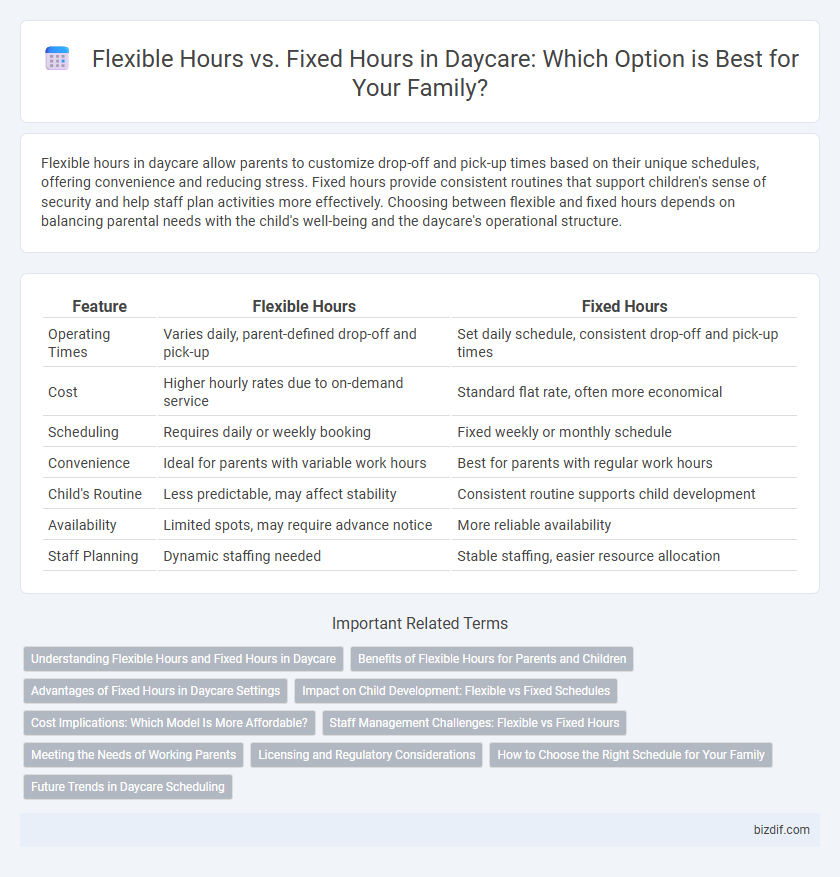Flexible hours in daycare allow parents to customize drop-off and pick-up times based on their unique schedules, offering convenience and reducing stress. Fixed hours provide consistent routines that support children's sense of security and help staff plan activities more effectively. Choosing between flexible and fixed hours depends on balancing parental needs with the child's well-being and the daycare's operational structure.
Table of Comparison
| Feature | Flexible Hours | Fixed Hours |
|---|---|---|
| Operating Times | Varies daily, parent-defined drop-off and pick-up | Set daily schedule, consistent drop-off and pick-up times |
| Cost | Higher hourly rates due to on-demand service | Standard flat rate, often more economical |
| Scheduling | Requires daily or weekly booking | Fixed weekly or monthly schedule |
| Convenience | Ideal for parents with variable work hours | Best for parents with regular work hours |
| Child's Routine | Less predictable, may affect stability | Consistent routine supports child development |
| Availability | Limited spots, may require advance notice | More reliable availability |
| Staff Planning | Dynamic staffing needed | Stable staffing, easier resource allocation |
Understanding Flexible Hours and Fixed Hours in Daycare
Flexible hours in daycare allow parents to drop off and pick up their children within a broader time frame, accommodating varying schedules and promoting convenience. Fixed hours require children to be dropped off and picked up at set times, ensuring a consistent routine that can support the child's sense of security and help daycare staff maintain structured activities. Understanding the benefits and challenges of both flexible and fixed hours helps parents choose the best fit for their family's needs and their child's development.
Benefits of Flexible Hours for Parents and Children
Flexible hours in daycare provide parents with the advantage of adapting drop-off and pick-up times to their work schedules, reducing stress and improving work-life balance. Children benefit from a more relaxed routine that aligns with their natural rhythms, promoting better emotional well-being and development. This adaptability supports families with varying needs and fosters a nurturing environment that accommodates individual growth.
Advantages of Fixed Hours in Daycare Settings
Fixed hours in daycare settings provide consistent scheduling that helps children develop strong daily routines, promoting stability and security essential for early childhood development. These set times allow parents to plan their work and personal commitments efficiently, improving overall family time management. Structured hours also aid staff in organizing activities and ensuring optimal supervision, enhancing the quality of care and learning experiences.
Impact on Child Development: Flexible vs Fixed Schedules
Flexible hours in daycare allow children to adapt to personalized routines, promoting emotional security and reducing stress by accommodating individual family needs and natural sleep patterns. Fixed schedules establish consistent daily rhythms, which enhance cognitive development and behavioral regulation by providing predictable structure and fostering time management skills. Both approaches impact child development differently, with flexibility supporting adaptability and fixed hours encouraging stability and routine mastery.
Cost Implications: Which Model Is More Affordable?
Flexible hours in daycare often result in higher costs due to variable staffing and operational requirements, whereas fixed hours typically provide more predictable, lower rates benefiting budgeting for families. Daycare centers with fixed schedules optimize resource allocation, reducing overhead and allowing for discounted pricing compared to the premium rates charged for adaptable, on-demand care hours. Evaluating hourly rates, enrollment fees, and potential overtime charges ultimately clarifies that fixed-hour models generally offer more affordable childcare solutions.
Staff Management Challenges: Flexible vs Fixed Hours
Managing staff schedules in daycare centers with flexible hours demands dynamic coordination to accommodate varying parental needs, often leading to unpredictable staffing levels and potential understaffing. Fixed hours provide consistency and easier shift planning but may reduce staff availability during peak demand times, increasing the risk of burnout. Balancing flexible and fixed hours requires strategic workforce management to ensure optimal caregiver-to-child ratios and maintain quality care.
Meeting the Needs of Working Parents
Flexible hours in daycare centers accommodate the unpredictable schedules of working parents, allowing drop-off and pick-up times beyond the traditional fixed hours. Fixed hours provide routine and structure, which benefit children's development but may not align with varying work shifts. Offering flexible hours helps meet the diverse needs of working parents by reducing stress and improving work-life balance.
Licensing and Regulatory Considerations
Daycare centers offering flexible hours must adhere to licensing regulations that often require detailed documentation of operating times and staff-to-child ratios during varied schedules. Fixed hours simplify compliance by maintaining consistent supervision levels, making it easier to meet regulatory standards set by local childcare authorities. Both models must ensure all safety, health, and child development regulations are continuously satisfied to maintain licensing approval.
How to Choose the Right Schedule for Your Family
Choosing between flexible hours and fixed hours for daycare depends on your family's lifestyle, work commitments, and childcare needs. Flexible hours offer adaptability for parents with variable schedules, while fixed hours provide consistency that benefits routines and social development for children. Evaluating your daily demands and your child's temperament helps determine the most suitable daycare schedule.
Future Trends in Daycare Scheduling
Daycare centers are increasingly adopting flexible hours to accommodate diverse family schedules and the growing demand for personalized childcare solutions. Advances in digital scheduling platforms enable real-time adjustments, allowing parents to tailor drop-off and pick-up times without strict adherence to fixed hours. Future trends indicate a shift towards hybrid models, combining core fixed hours with optional flexible periods to enhance convenience and optimize resource utilization.
Flexible Hours vs Fixed Hours Infographic

 bizdif.com
bizdif.com